GREENEVILLE – Tusculum University students showcased their creativity, research and presentation skills Friday, April 19, at the Academic Symposium on campus, an event that highlights the high-quality hands-on learning they receive from the higher education institution.
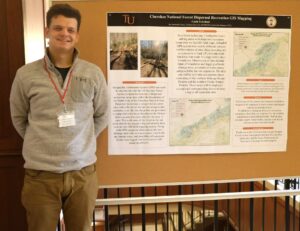
Student Caleb Swinehart stands by his poster.
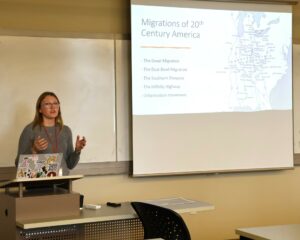
Student Sydney May gives her presentation during the Academic Symposium.
Thirty-four students exhibited multiple forms of art, research papers and posters that revealed their talent and the knowledge they have gained during their studies. Among the academic programs represented were art and design, biology, chemistry, English, environmental science. history, mathematics, psychology and sport science. People can view the list of students who participated, their majors and their subject matter at https://www3.tusculum.edu/news/tusc-family/2024/25317/.
In addition, a Tusculum alumna gave students valuable tips as she detailed her journey from her undergraduate days to now holding a doctorate. Dr. Scott Hummel, the university’s president, praised the students for their product as he touted the value of a Tusculum education.
“One of the core components of our mission statement is that Tusculum University provides an active and experiential education,” Dr. Hummel said. “There is too much of the American education system that’s passive – here’s the syllabus, read what I tell you to read, write what I tell you to write and no more. That’s not an ideal process. But an active and experiential education, where you are participating in research, in labs, in internships and in other forms of engaging learning, is what Tusculum supplies.
“If we had a passive approach, we would not see the level of scholarship and research that you are presenting today.”
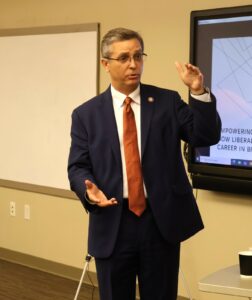
Dr. Hummel speaks at the Academic Symposium.
Dr. Hummel noted that Tusculum students have more opportunities to engage with and know their professors than their counterparts at larger higher education institutions. Some people might have the impression that larger institutions provide more ways for undergraduate students to participate in a high level of research. But that is not the case for Tusculum students.
Dr. Hummel said he has spoken with many alumni who have attended other universities for a master’s degree or doctorate degree Tusculum does not offer and have told him how ready they are when they enter those doors.
“You are being better prepared for your career and for graduate school,” he said. “You might not fully appreciate it until you arrive at another institution and you see others who are smart but have not had the experiences you have enjoyed at Tusculum. It’s nice for you to start off graduate school a step ahead. I’m proud of you, and I hope you are proud of yourselves.”
Students also listened to an inspiring message via Zoom from Dr. Loren Peeters, a 2019 Tusculum graduate, who earned a bachelor’s degree in psychology and a biology minor. She has now completed the requirements for her doctorate from East Tennessee State University. During her Tusculum studies, she earned a Research in Psychology Award and was published in the Alpha Chi honor society’s undergraduate journal before joining the ETSU biomedical science program. She has continued to be published and will be a post-doctoral fellow at Vanderbilt University.
Like more than 50% of Tusculum students, Dr. Peeters was a first-generation student, meaning her parents do not have an undergraduate degree. She was introduced to research by her academic advisor, Dr. Kate Smith, associate professor of psychology at Tusculum, who helped her design and implement a research project on the way messages in the media can impact a woman’s decision to pursue careers in male-dominated fields. She said Dr. Gall, chair of Tusculum’s Psychology Department, helped her publish the research.
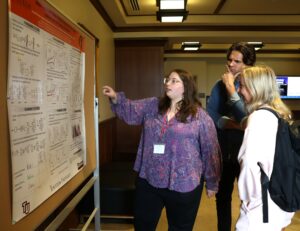
Student Skylar Lane, left, discusses her poster with fellow Pioneers.
Dr. Peeters said she learned more about designing and conducting a research project at Tusculum than she would have at another undergraduate institution. She said Dr. Smith has been one of her biggest supporters and helped her secure a spot in the doctoral program at ETSU. She said Dr. Smith and Dr. Gall have continued to assist her since her graduation, including her receipt of a National Institute of Health grant.
“No man or woman is an island, and no matter how hard I worked or how well I wrote, I never would have been selected as an awardee without the help of the recommendation letters Dr. Smith and Dr. Gall wrote on my behalf,” Dr. Peeters said. “Dr. Gall also attended my dissertation defense a couple of weeks ago. No matter what career path you’re on, I can’t stress enough how important it is to have people in your corner who want to see you succeed.”
She provided students with some of the lessons she has learned:
- Be open to possibilities.
- Embrace your imposter syndrome.
- Take control of your own learning in and out of the classroom.
- Embrace your background.
- Seek out a community that will raise you up and help you get where you want to be.
- Understand that where there’s a will, there’s a way.
- Be the captain of your own ship.
- Do what scares you.
Leading the symposium were Dr. Smith and Dr. Peter Noll, professor of public history and museum studies. This is the fourth year for this event. Dr. Noll said the symposium provides a forum for students to share their academic work and the academic community to come and celebrate it.
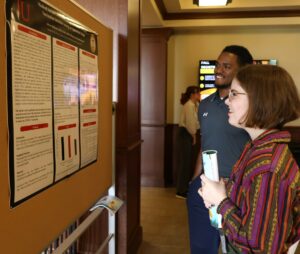
Student Adrian Robinson left, talks about his poster with fellow Pioneer Emme Foster.
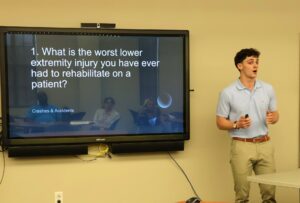
Student Connor Jordan gives his presentation during Academic Symposium.
“It’s a very enjoyable day,” Dr. Noll said. “The students who come and present appreciate it and feel good about it. Having the chance to stand up in front of a group of people and demonstrate what you are capable of accomplishing is important for building the soft skills that go along with academic training.”
Dr. Smith said the symposium has an internal value of spreading the word within Tusculum about all that is transpiring in research and creativity. Another benefit is to expose students who have not yet conducted research in their early years at the university to what they can expect as they continue their studies at Tusculum.
“All of this work is to help students not only grow in their discipline but get them to the next step in their development,” Dr. Smith said. “As long as it’s going to get them to that next stage and help them grow in their careers, that is what we want from it. One of the things I like about our symposium is that it is relaxing but has clear standards. Our students have to hit certain targets and achieve a certain quality level as determined by faculty members to qualify for presentation. Students who are selected are exceptional. That really enhances the symposium.”
At the conclusion of the symposium, participants enjoyed ice cream from local business Creamy Cup.
To learn more about the university, please visit www.tusculum.edu.


